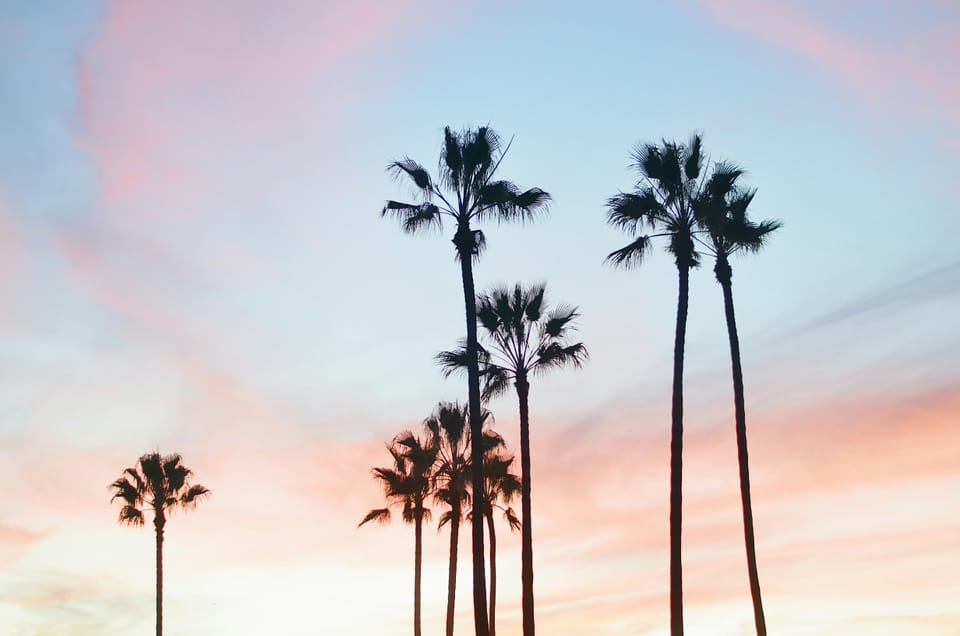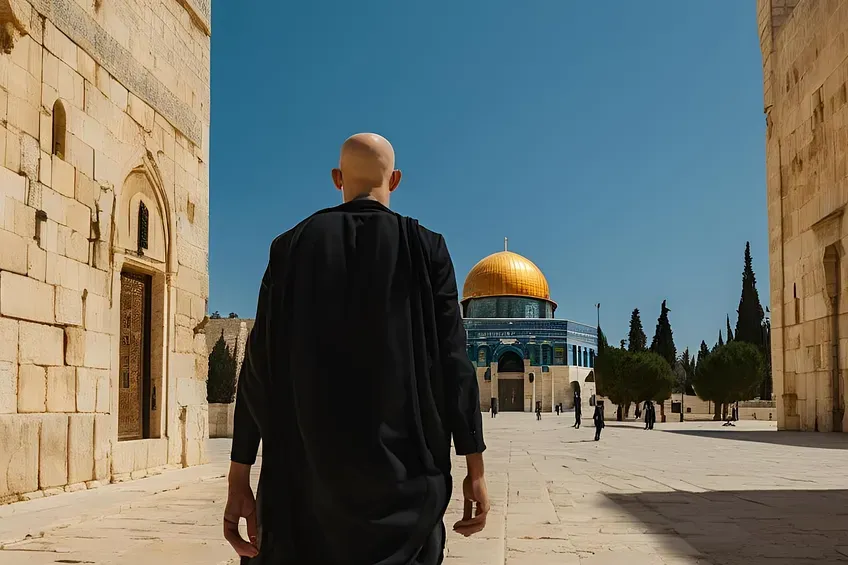From Cross to Crescent: My Journey to Islam

Asalaamu Alaikum friends! For those who also follow me on social media, I shared this weekend that I have embraced Islam.
I know this news may have shocked or is shocking many of you. I won’t go into all the details here, but as a community I value and cherish, I want to share how I came to this decision.
To start, I didn’t decide to become Muslim on a whim or without considering the ramifications. I have been wrestling with this for the better part of a year. I have been open and transparent about it with my wife and children. They also blessed this decision, as I would never want to do something that would create distance or friction between me and my family. Though they fully support my decision to become a Muslim, they remain Christians. So, we’re also on a journey to learn to be an interfaith family.
For the last six months, I have gone back and forth about embracing Islam so many times that I have lost count. This isn’t hyperbole; I legitimately don’t remember how many times I’ve told Angela, “It’s time. I’m going to become Muslim,” to then entirely back out a few days later.
The natural question I’m willing to bet most of you are asking is, “Why?” Why, after being a Christian for 20 years, would I walk away from the faith? Why would I embrace Islam as someone with Jewish ancestry? Why would someone who holds deep progressive values socially and culturally choose Islam as the religion to guide them in spiritually living out those convictions? All these are great questions. I won’t answer these questions specifically, but I will broadly share my “why.”
Three Reasons Why I Embraced Islam
Each reason below describes a different area of my life where I experienced a pull toward Islam. For those asking, “What do you mean by a pull toward Islam?” I wish I had better language to explain this feeling. The best I can muster is that there has been a constant pull in my heart and mind toward the Muslim world and Islam. Hopefully, my explanations below will provide more context that illustrates how this affects different areas of my life.
Social/Political
October 7th has changed the lives of hundreds of thousands, if not millions, of people. When Hamas attacked Israel, killing approximately 1,200 Jewish people and taking 240 others hostage, my world changed.
Initially, like most American Christians who are imbued with some form of Zionism, my initial response was to side with the people of Israel and see this event as another example of “those” Muslim extremists hating God’s people. The way I was taught to understand this conflict was not through a political and historical lens but from a religious one.
What was at stake was the word of God, as the Hebrew Bible promises the Jewish people a strip of land by Yawheh. If the Hebrew people weren’t in the land God promised, could the Bible be trusted? Could God be trusted? Was there even a God? OMG, the fate of all things holy depended on Israel living on a plot of land the size of New Jersey!!! Or so I was taught to believe.
In a bit of cosmic irony, what began to change my perspective on Israel and Palestine was taking my family to visit a Synagogue. On the first Friday after October 7th, I had the day off from work. As a sign of solidarity with the Jewish people, I took my family to a synagogue close to our home for a Shabbat service. For context, my late grandmother was a member of this synagogue for decades before she passed away. She’s even buried in the synagogue’s cemetery. I remember going to this synagogue with my grandma and uncle as a child. As an adult, I had visited for another service a few months prior.
During the first service, I attended without my family, there was singing, people were friendly-ish, and the teaching was seasoned with some witty comments and a few Brené Brown quotes from the Rabbi. I attended the service partly because this synagogue is unique: both rabbis are women, they are outspoken in supporting the LGBTQ+ community, and, as I mentioned, I have some family ties.
On October 13th, when I took my family to visit the synagogue, the vibe was very different. In one sense, I understand entirely that people were grieving and that the implications of the previous week’s attacks were not yet clear. Because of this, the atmosphere was understandably somber. However, during the teaching time, the Rabbi (the associate Rabbi this time) came up and gave a fiery zionist speech. Midway through the teaching, my wife and I looked at each other wide-eyed and astonished. I’ve only seen footage of nationalist rallies, but what my family and I were experiencing felt eerily similar to the nationalist propaganda we’ve seen.
The service gave off extremist propaganda vibes. Once we got to our car, my wife quickly expressed that she felt the same emotions I did, and neither of us wanted to experience that again. I was taken aback, shocked even. I couldn’t distinguish the difference between what I witnessed at this religious service and a Trump rally.
So many emotions and thoughts flooded through me and lingered for days. I asked myself questions like, Aren’t the Palestinians supposed to be the extremists? Aren’t Israel the victims and good guys here? Isn’t this synagogue progressive? If all these things are true, why on earth do I feel like I was inadvertently part of a nationalist convention from the mid-twentieth century?
This event took me on a research journey to learn about the history between Israel and Palestine, starting in the late 19th century. This post is not about this topic, but based on my research, I will say that the authority of the Bible and the trustworthiness of God have nothing to do with this conflict.
Fun fact: From the 4th century CE until the mid-twentieth century, did you know the Hebrew people did not live in or occupy the land of Palestine? Furthermore, throughout all of these centuries, there wasn’t a concern from the Jewish people about not living in the “promised land.” It was actually Christians during the rise of dispensational theology that emphasized the Hebrew people needing to live in Palestine. It wasn’t until after WWII and the Holocaust that Jewish people began to embrace the idea of having a homeland in Palestine.
The reality is the Hebrew people ended up in Palestine as a result of a toxic mix between European anti-semitism, a rise in nationalism, and the Holocaust. None of which was caused by the people of Palestine. They didn’t even play a role in creating or promoting any of the significant factors that led the Hebrew people to occupy their land.
Despite no fault of their own, the Palestinian people are living through a modern-day genocide at the hands of Israel, which America backs. I will not and cannot in good conscience stand on the side of genocide. Giving the Rabbi on that Shabbat service the benefit of the doubt, she could not have known Israel would respond in a genocidal manner. However, in continuing to follow the synagogue over the last several months, they have not condemned Israel’s actions. Instead, they have, time and time again, made excuses to justify these horrific actions. I don’t care how much the people committing the genocide believe God has uniquely chosen them; I will not stand on the side of genocide.
As horrific as what is being done to the Palestinian people is and how much Israel has destroyed the land of Palestine with American bombs, the Palestinian people’s story has changed my heart. Their strength and endurance living through a literal hell is what began to set my gaze on Islam.
Theological
If you’ve followed my writing for any length of time, you know I was already what many consider an “eclectic” Christian in my beliefs. Having been spoon-fed fundamentalism and, to my shame, eating it whole, I went through a season of deconstruction.
Coming out on the other side of that season, I felt closer to God than I have in years. I also felt more freedom in not needing to suppress my convictions, questions, or beliefs to fit in with the mainstream church. Despite this newfound freedom and liberation, I was increasingly experiencing Christians distancing themselves from me.
Transparently, the more my theology changed, the greater the pushback, rejection, and, at times, hate I received from people I thought were friends. As my views changed and more and more Christians separated themselves from me, I began to ask myself, “Does what I believe about God and justice fit better within another religious tradition?” This question led me to research other ancient world religions.
I learned much from Buddhism, but quickly realized it offers more spiritual guidelines than a traditional religious system. That’s not to judge; Buddhism helped me process and become more present. However, I believe in God, and for better or worse, I think there is a 'more', and that more is known to humanity as God.
The negativity I received from my Christian peers began to outweigh the positive support. It was because of that small but faithful community that supported and encouraged me that I tried to make Christianity work. I’ll talk about Christianity in the next section.
After the research I did on Israel/Palestine, Judaism was no longer an option. Despite Judaism, the religion, and Zionism, the political ideology, being two very different things, tragically, the current Israeli government has made them virtually synonymous. I wasn’t going to trade one religion hijacked by nationalism (looking at you, evangelicals) for another. This left me with Islam.
What initially drew me to Islam was how clear it is that its adherents are deeply passionate about two things: the oneness of God and justice in the world. In doing my research, many of my preconceived notions and prejudices (let’s call it what it was) about Muhammad (PBUH) and Islam began to change.
For those interested, these are the three books that played the most significant role in changing my perspective on Islam:
- Islam: A Short History by Karen Armstrong
- Muhammad: A Prophet for Our Time by Karen Armstrong
- No god, but God: The Origins, Evolution, and Future of Islam by Reza Aslan
By this point in my journey, the history and current plight of the Palestinian people began to change my heart and mind concerning the Muslim people. Through my religious research, I only felt more isolated by Christianity. Islam became a place where I saw myself in the people who are already part of this tradition. Very little of my theology needed to change because much of it already aligned with Islam. The reservations I had about Muhammad (PBUH) and the history of the movement no longer existed after reading for myself and talking to Muslims to ask them what they actually believed.
Personal
I mentioned the amount of anger and rejection I have experienced at the hands of fellow Christians over the last few years in the section above. When I took a step back and processed the previous five years as a Christian, this is all I could think about:
- I remember my entire team being laid off on a whim from a church we had all been faithfully a part of for years.
- Being forced to sign an NDA by the church that laid us off.
- Moving my family a thousand miles from home to join another church where the leadership was just as toxic. In the less than two years I was in Atlanta, the church we joined split, the majority of elders resigned, at least half the staff quit, and the lead pastor never batted an eye. Throughout the entire ordeal, he played the victim, pretended as if what was happening was a regular part of a church’s life, and gaslit everyone around him.
- Then there was Hope… I still can’t talk about that trainwreck. If you want to know more, I have written about my experiences here and here.
- I’ve been part of multiple churches led by narcissistic and toxic leaders who cover up all manner of abuse, including gaslighting, belittling, and demeaning women, encouraging homophobia, child abuse, substance abuse, and spiritual/emotional abuse.
Some sweet moments in the church and a few friends have made my last few years there bearable. I will forever be grateful to them for their compassion, patience, and kindness.
Reflecting on all that I experienced as a pastor, what I put my family through as a husband and father, and personally as a Christian, I am convinced that what we call the ‘church’ is nothing close to what Jesus envisioned.
What I have found in Islam is a fresh start. I have seen people who, like me, are passionate about the oneness of God. I have found a community that emphasizes the good of the community over the individual. I have found a place where my life and experiences don’t make me “other” in a religion full of affluence and whiteness. I know it’s not perfect, and there are sacrifices and losses that I am just starting to experience because of this decision. But I stand by my conviction that this is where God has led me. Islam is now my home.




